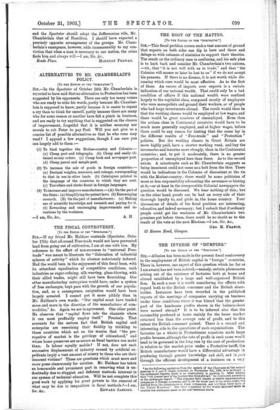THE ROOT OF THE MATTER.
[To THE EDITOR OF THE "SPECTATOR."] SIE,—This fiscal problem covers such a vast amount of ground that experts on both sides can dip in here and there and deluge us with columns of statistics to support their theories. The result on the ordinary man is confusing, and his safe plan is to hark back and consider Mr. Chamberlain's two axioms, —viz., that " it is not well with us in trade," and that " the Colonies will sooner or later be lost to us " if we do not accept his panacea. If there is no disease, it is not worth while dis- cussing which cure would be most effective. As to the first of these. An excess of imports over exports is a certain indication of our national wealth. That could only be a bad condition of affairs if this national wealth were confined largely to the capitalist class, composed mostly of employers who were monopolists and ground their workers, or of people who had large investments abroad. The result would then be that the working classes would be employed at low wages, and there would be great numbers of unemployed. Even then the artisan class in Continental countries would have to be much more generally employed, and at higher wages, before there could be any reason for hinting that the cause lay in the different results of " Free-trade " and " Protection " policies. But the working classes in Great Britain are more highly paid, have a shorter working week, and buy the necessaries and luxuries more cheaply, than in the Continental countries ; and, to put it moderately, there is no greater proportion of unemployed here than there. As to the second axiom. A catastrophe such as Mr. Chamberlain suggests as being imminent could not come as a bolt from the blue. There would be indications in the Colonies of discontent at the tie with the Mother-country ; there would be some politician of more or less responsibility advocating the severance or hinting at it,—or at least in the irresponsible Colonial newspapers the question would be discussed. We hear nothing of this ; but on the other hand, proofs can be had on every side of their thorough loyalty to, and pride in, the home country. Your discussions of details of the fiscal problem are interesting, educative, and indeed necessary; but I submit that if ordinary people could get the weakness of Mr. Chamberlain's two premises put before them, there could be no doubt as to the result of the vote at the next Election.—I am, Sir, &c.,


















































 Previous page
Previous page